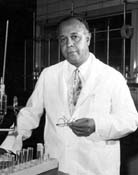 Percy Lavon Julian (April 11, 1899 – April 19, 1975) was research chemist and a pioneer in the chemical synthesis of medicinal drugs from plants. He was the first to synthesize the natural product physostigmine; and was a pioneer in the industrial large-scale chemical synthesis of the human hormones, steroids, progesterone, and testosterone, from plant sterols such as stigmasterol and sitosterol. His work would lay the foundation for the steroid drug industry's production of cortisone, other corticosteroids, and birth control pills. He later started his own company to synthesize steroid intermediates from the Mexican wild yam. His work helped reduce the cost of steroid intermediates to large multinational pharmaceutical companies.
Percy Lavon Julian (April 11, 1899 – April 19, 1975) was research chemist and a pioneer in the chemical synthesis of medicinal drugs from plants. He was the first to synthesize the natural product physostigmine; and was a pioneer in the industrial large-scale chemical synthesis of the human hormones, steroids, progesterone, and testosterone, from plant sterols such as stigmasterol and sitosterol. His work would lay the foundation for the steroid drug industry's production of cortisone, other corticosteroids, and birth control pills. He later started his own company to synthesize steroid intermediates from the Mexican wild yam. His work helped reduce the cost of steroid intermediates to large multinational pharmaceutical companies.
During his lifetime he received more than 130 chemical patents. Julian was one of the first African Americans to receive a doctorate in chemistry. He was the first African-American chemist inducted into the National Academy of Sciences, and the second African-American scientist inducted from any field.
Julian graduated from DePauw in 1920 Phi Beta Kappa and valedictorian. Julian wanted to obtain his doctorate in chemistry, but learned it would be difficult for an African American. After graduating from DePauw, Julian became a chemistry instructor at Fisk University. He then received an Austin Fellowship in Chemistry and went to Harvard University in 1923 for his M.S. Worried that white students would resent being taught by an African American, Harvard withdrew Julian's teaching assistantship. He was unable to complete his Ph.D. at Harvard. In 1929, while an instructor at Howard University, Julian received a Rockefeller Foundation fellowship to continue his graduate work at the University of Vienna, where he earned his Ph.D. in 1931.
After teaching at Howard University, Julian joined the Glidden Company in 1936. He then designed and supervised construction of the world's first plant for the production of industrial-grade, isolated soy protein from oil-free soybean meal.
Julian's research at Glidden changed direction in 1940 when he began work on synthesizing progesterone, estrogen and testosterone from the plant sterols, stigmasterol and sitosterol, isolated from soybean oil by a foam technique he invented. At that time clinicians were discovering many uses for the newly discovered hormones. However, only minute quantities could be produced from the extraction of hundreds of pounds of spinal cords.
In 1940 Julian was able to produce 100 lb of mixed soy sterols daily, which had a value of $10,000, in sex hormones. Julian was soon ozonizing 100 pounds daily of mixed sterol dibromides. The result was the female hormone progesterone which was put on the American market in bulk for the first time. Production of other sex hormones soon followed. His work made possible the production of these hormones on a larger (kilogram) industrial scale, with the potential of reducing the cost of treating hormonal deficiencies.
In 1953, Julian founded his own research firm, Julian Laboratories, Inc. He brought many of his best chemists, including African Americans and women, from Glidden to his own company. Julian won a contract to provide Upjohn with $2 million worth of progesterone.
In 1964, Julian founded Julian Associates and Julian Research Institute, which he managed for the rest of his life. He was elected to the National Academy of Sciences in 1973 in recognition of his scientific achievements. He was the second African American to be inducted, after David Blackwell.